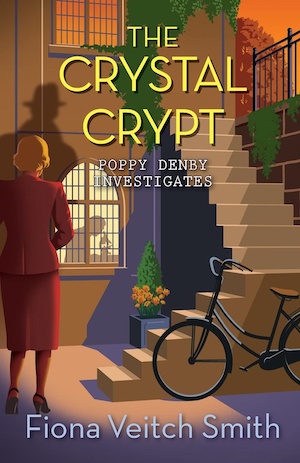The Crystal Crypt marks the sixth investigative outing for reporter and amateur sleuth Poppy Denby. It’s a story that sees the sins of the past come back to haunt her, with former friends and foes resurfacing to destabilise her professional life at just the same moment that her personal life appears to be taking a turn toward the precarious. She might be largely enjoying life in London during the Roaring Twenties, but various factions – some more deadly than others – are not pleased to witness Poppy taking aim at the journalistic glass ceiling or taking up the causes of marginalised, persecuted and oppressed individuals. It’s lucky that Poppy is a trailblazing and tenacious investigator who doesn’t let a spot of deadly danger put her off as in The Crystal Crypt she is once again going to have to confront the fact that doing the right thing very rarely entails doing the easy thing.
When Poppy agrees to accompany best friend Delilah Marconi to a lecture at the Royal Institution, she expects a dull evening to be in store for them, not an evening that will prompt her to embark on another murder investigation. However, that’s before the pair bump into old acquaintance Sophie Blackburn, the former fiancée of the journalist whose death inspired Poppy to begin her investigative career. Sophie is now working as a lab assistant at a top-secret Oxford laboratory known as the Crystal Crypt, and she tells Poppy about the recent death of Dr June Leighton, the only female scientist working on the project. While the police determined June’s death to be the result of an accidental electrocution, Sophie believes that her former colleague was murdered, making oblique references to harassment and secrets that June had been troubled with in the weeks prior to her death.
Despite her initial scepticism, Poppy agrees to look into June’s death, albeit only in the guise of writing a Women in the Workplace column about her life and work as a pioneering female scientist. Editor Rollo Rolandson warns her that Sophie recently spent some time in an asylum and so might not be either trustworthy or safe, but reluctantly agrees to the story. Poppy heads to Oxford where her encounters with June’s former colleagues at the lab and with fellow members of the all-female Somerville College soon cause her to think that there might have been something suspicious about June’s death after all. In fact, despite her cover story and precautions, it quickly becomes apparent that more than one person suspects why Poppy has really come to Oxford, and at least one of them is willing to do whatever it takes to prevent her from undercovering the truth.
The latest instalment in the Poppy Denby Investigates series is another cracking piece of historical crime fiction by Fiona Veitch Smith. The author’s enthusiasm for the 1920s really shines through and her in-depth knowledge of the period ensures that the settings and dialogue ring true, even if the cast of main characters is rather more eclectic than would have been the case on newspapers at the time. Despite the froth and frivolity commonly shown to characterise the period, the 1920s was not exactly the decade of inclusion, even if things were slowly beginning to change in some regards. With that in mind, its no surprise that the characters in The Crystal Crypt encounter misogyny, racism and distressing comments concerning mental and physical differences during the course of Poppy’s investigation. Such scenes, coupled the disturbing descriptions of the crimes, move this novel away from cosy crime fiction.
Poppy herself is on fine form when it comes to sleuthing in The Crystal Crypt, venturing to go where others opt not to explore, although matters in her personal life, principally her relationship with photographer Daniel Rokeby, do sometimes cause a distraction, possibly delaying her unravelling of the ultimate puzzle. The relationship with Daniel has been on-again, off-again throughout the series, and it’s interesting to note that while Poppy clearly does want the kind of married life that was the almost universal aspiration at the time, she is concerned about what marriage would mean for her hard-won career. Will she be able to continue as a journalist while also being a wife and mother? It’s an issue that was little covered books featuring female sleuths written during the Golden Age of Crime, so Fiona Veitch Smith’s take on the matter adds an extra layer of interest to the plot.
While The Crystal Crypt can certainly be read as a standalone story, there is a lot of backstory to digest and, given that the murder of Dr June Leighton serves to allow Poppy to tie up various strands of mysteries that she has been puzzling over since the beginning of the series, it would probably best be read after the five preceding books. The murder mystery itself is very well plotted and, due to the number of unpleasant and bigoted characters that Poppy encounters, there is no shortage of suspects to consider, which renders The Crystal Crypt a particularly satisfying puzzle to untangle.
For another 1920s woman detective, try the graphic novel Minky Woodcock: The Girl Who Handcuffed Houdini.
Lion Fiction
Print/Kindle
£6.22
CFL Rating: 4 Stars
Purchase from Bookshop.org and help support independent bookshops.
